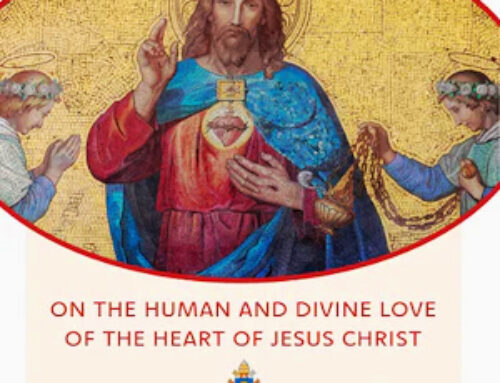(This article originally appeared in the Spring 2022 Issue of the TAU-USA #105)

On November 11, 2021, in the Vatican Apostolic Palace, the Holy Father Francis received in audience the participants in the General Chapter of the Secular Franciscan Order, to whom he addressed the following words:
Dear brothers and sisters of the Franciscan Secular Order, good morning!
I greet you with the words Saint Francis addressed to those he met along the way: “The Lord give thee peace!”. I am pleased to welcome you on the occasion of your General Chapter. In this context I would like to recall some elements proper to your vocation and mission.
Your vocation is born of the universal call to holiness. The Catechism of the Catholic Church reminds us that “lay people share in Christ’s priesthood: ever more united with Him, they exhibit the grace of Baptism and Confirmation in all dimensions of their personal family, social and ecclesial lives, and fulfill the call to holiness addressed to all the baptized”.
This holiness, to which you are called as Secular Franciscans, as the General Constitutions and the Rule approved by Saint Paul VI ask of you, involves the conversion of the heart, attracted, conquered and transformed by the One who is the only Holy One, who is “the good, every good, the supreme good” (Saint Francis, Praises of God Most High). This is what makes you true “penitents”. Saint Francis, in his Letter to all the faithful, presents “doing penance” as a path of conversion, a path of Christian life, a commitment to do the will and works of the heavenly Father. In his Testament, he describes his own process of conversion in these words, which you know well: “The Lord gave to me, Brother Francis, thus to begin to do penance; for when I was in sin it seemed to me very bitter to see lepers. … And when I left them, that which had seemed to me bitter was changed for me into sweetness of body and soul. And afterwards I remained a little and I left the world (1-3).
The process of conversion is thus: God takes the initiative: “The Lord gave to me to begin to do penance”. God leads the penitent to places where he would never have wanted to go: “God led me among them, the lepers”. The penitent responds by accepting to place himself at the service of others and by using mercy with them. And the result is happiness: “That which had seemed to me bitter was changed into sweetness of mind and body.” Exactly the path of conversion taken by Francis.
This, dear brothers and sisters, is what I urge you to achieve in your lives and in your mission. And, please, let us not confuse “doing penance” with “works of penance”. These – fasting, almsgiving, mortification – are consequences of the decision to open one’s heart to God. Open your heart to God! To open one’s heart to Christ, living in the midst of ordinary people, in the style of Saint Francis. Just as Francis was a “mirror of Christ”, so may you too become “mirrors of Christ”.
You are men and women committed to living in the world according to the Franciscan charism. A charism that consists essentially in observing the holy Gospel of our Lord Jesus Christ. The vocation of the Secular Franciscan is to live the Gospel in the world in the style of the Poverello, sine glossa; to take the Gospel as the “form and rule” of life. I urge you to embrace the Gospel as you embrace Jesus. Let the Gospel, that is, Jesus Himself, shape your life. In this way you will take on poverty, minority and simplicity as your distinguishing marks before all.
With this Franciscan and secular identity of yours, you are part of the outbound Church. Your favorite place to be is in the midst of the people, and there, as lay people – celibate or married -, priests and bishops, each according to his or her specific vocation, to bear witness to Jesus with a simple life, without pretension, always content to follow the poor and crucified Christ, as did Saint Francis and so many men and women of your Order. I encourage you too to go out to the peripheries, the existential peripheries of today, and there to make the word of the Gospel resound. Do not forget the poor, who are the flesh of Christ: you are called to proclaim the Good News to them (cf. Lk 4:18), as did, among others, Saint Elizabeth of Hungary, your Patroness. And just as the “fraternities of penitents” of yesteryear distinguished themselves by founding hospitals, dispensaries, soup kitchens and other works of genuine social charity, so today the Spirit sends you to exercise the same charity with the creativity required by the new forms of poverty.
May your secularity be full of closeness, compassion and tenderness. And may you be men and women of hope, committed to living it and also to “organizing” it, translating it into real everyday situations, in human relations, in social and political engagement; nurturing hope in tomorrow by alleviating the pain of today.
And, dear brothers and sisters, you are called to live this in fraternity, aware that you are part of the great Franciscan family. In this regard, I remind you of Francis’ desire that the entire family remain united, certainly with respect for the diversity and autonomy of its various components and also of each member. But always in a lively mutual communion, to dream together a world in which we are all, and all feel, that we are brothers, and working together to build it (cf. Encyclical Letter Fratelli tutti, 8): men and women who fight for justice, and who work for an integral ecology, collaborating in missionary projects and making yourselves artisans of peace and witnesses to the Beatitudes.
In this way we started out with the path of conversion, and then all these proposals of fruitfulness, that come from the heart joined to the Lord, and that loves poverty. May Saint Francis and all the Saints of the Franciscan family accompany you on your journey. May the Lord bless you and may Our Lady, “Virgin made Church”, protect you. And please do not forget to pray for me. Thank you.
Questions for Reflection
- Many people think holy people are people who perform many acts of piety, people who are frequently around church and doing “churchy” things. Pope Francis instead connects holiness with our life of penance, allowing our hearts to be converted, “attracted, conquered and transformed by the One who is the only Holy One, who is ‘the good, every good, the supreme good.’” This “doing penance” is not merely “acts of penance” but becoming a mirror of Who are some of the people you have known who are “mirrors of Christ”? What makes them such clear mirrors?
- What do you do that helps your heart to become more “attracted, conquered, and transformed” by the Holy One? How have both pious acts and moments of ordinary life (like St Francis meeting the leper on the road) been opportunities for you to become more in love with God?
- What is a time you have gone “to the peripheries”? Describe the effect that experience had on you, on your heart.
- For some, politics is about elections and But Pope Francis lays out a vision where all of our human relationships are bound together in a community that allows for our political participation, not compartmentalized, but every aspect of our community life connected to our involvement in each other’s lives and also connected to our call to holiness, to being mirrors of Christ. What is one way that this vision challenges you to consider something different about how you are living your life? Is there at least a small way that you might respond to this challenge?
- “Your favorite place to be is in the midst of the people … to bear witness to Jesus with a simple life, without pretension, always content to follow the poor and crucified Christ.” How do you think Pope Francis is trying to encourage us by declaring that our secularity, our being “in the midst of the people” is our “favorite place”?
- Just as the “fraternities of penitents” of yesteryear distinguished themselves by founding hospitals, dispensaries, soup kitchens and other works of genuine social charity, so today the Spirit sends you to exercise the same charity with the creativity required by the new forms of
What are some of the “new forms of poverty” that you see? What are some of the opportunities you and the members of your fraternity have to respond to these new forms of poverty?
- Not all of us are great “organizers” of Yet we are each called to nurture hope. How does our fraternity help to nurture hope and exercise compassion and closeness, for each other and for those outside our fraternity as well?




Well. Praying for our world leader the Pope in communion with the Saints like all Catholics. As a Franciscan following our rule to help the Pope rebuild the Church with diplomacy and civil and canon law.
I guess my original comment was deleted… so thanks to Pope Francis for his gracious message and challenge to reach the margins and peripheries with the Gospel, Jesus Himself, and live the Gospel life and Rule in joy and called to holiness in all areas of life, despite circumstances and in the midst of people, especially the poor. Numbers 6:24-27, 1Jn 4:4,